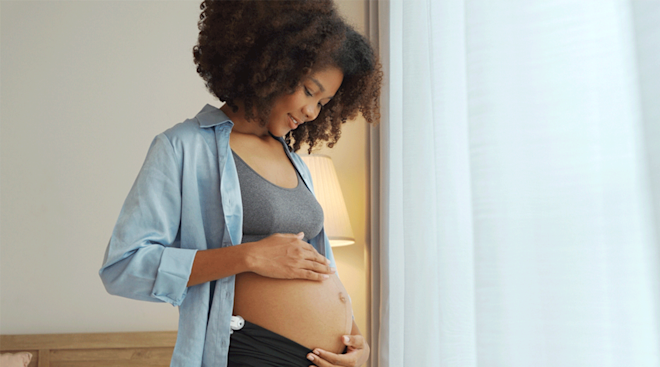
Bleeding and Spotting During Pregnancy: What It May Mean
When you’re pregnant, the last thing you want to see is blood in your underwear. That flash of red or brown can instantly conjure up fears of miscarriage—but bleeding and spotting during pregnancy is more common than you’d think, and it’s not always a signal something is wrong. Read on to help you navigate the ins and outs of pregnancy spotting, including why you might be bleeding and what to do about it.
“Vaginal bleeding is actually quite common in pregnancy,” says Michael Cackovic, MD, an ob-gyn and maternal fetal medicine specialist at the Ohio State University Wexner Medical Center. In fact, about 20 percent or more of women experience some form of bleeding during the first trimester, and the majority go on to have perfectly healthy pregnancies. “The bleeding may be any combination of light or heavy, intermittent or constant, painless or painful,” Cackovic says. But while many women experience bleeding during pregnancy, it’s not considered normal and should always be evaluated by a doctor.
If you experience spotting while pregnant, it’s easy to imagine worst-case scenarios, but in reality, it could be due to something much more innocent—while it still merits a call to your doctor, light spotting during pregnancy isn’t usually cause for alarm.
It’s important to be able to distinguish pregnancy spotting from full-on bleeding, since they can indicate different things. The key difference between the two is the amount of blood you see and the source of the bleeding: Spotting is lighter (some drops here and there) and can last for a few days, says Jennifer Wider, MD, a women’s health expert. Bleeding, on the other hand, is a heavier flow, similar to a menstrual period, and can be more worrisome, especially if accompanied by cramps.
Here, the common causes of spotting during pregnancy:
• Implantation spotting. After your egg is fertilized, it embeds itself in your uterine wall, which can cause spotting about a week after conception, says G. Thomas Ruiz, MD, an ob-gyn at MemorialCare Orange Coast Medical Center in Fountain Valley, California. “It’s usually fairly light but can be heavy enough that some people think it’s a light period.” Implantation spotting can be disappointing (if you assume it’s your period) or alarming, but it’s actually a happy sign you’re pregnant.
• Sex. During pregnancy, your cervix is especially sensitive, and “the friction of the penis hitting the area can make it bleed,” Cackovic says.
• Cervical abrasion. “Spotting sometimes just comes from an abrasion on the cervix or in the vagina,” Cackovic says. This could be caused from intercourse or even a gynecological exam, such as a vaginal ultrasound. Typically, the abrasion will heal within a few days.
• Cervical polyps. While harmless, polyps on the cervix are more prone to light bleeding during pregnancy thanks to your higher estrogen levels and increased number of blood vessels in the cervical tissue. Contact with the polyps—such as during sex or a vaginal exam—can prompt spotting.
• A weak cervix. Your cervix is supposed to stay tightly closed during pregnancy to protect your growing baby, but it doesn’t always work out that way. Sometimes the cervix will shorten or weaken in the second trimester, leading to spotting, Ruiz says. “If we catch it in time, we can put a stitch around the cervix to save the pregnancy,” he says.
A study revealed that one in four women experienced spotting in the first trimester, usually occurring around week 6 or 7 of pregnancy. The good news? This pregnancy spotting wasn’t always an indication that anything was wrong.
Are you noticing some spotting in your first trimester? There are a few reasons you might experience bleeding in early pregnancy, and they range in severity.
• Hormonal changes. Sometimes pregnancy spotting is something as harmless as your body simply going through changes. In this case, light spotting can occur in early pregnancy and isn’t cause for concern. Stil, it’s important to rule out all possible dangers before attributing spotting to hormonal changes.
• Uterine wall bleeding. In some cases, women may experience bleeding from their uterine wall as the placenta and amniotic sac fill the space in a woman’s uterus, Ruiz says. “It can cause heavy bleeding but isn’t dangerous,” he says.
• Miscarriage. The majority of miscarriages occur within the first 13 weeks of pregnancy. If you have heavy bleeding accompanied by cramps, back pain, brown vaginal discharge or a sudden loss of pregnancy symptoms, it could be a sign of a miscarriage, Cackovic says. The risk of miscarriage in healthy women is anywhere from 10 to 25 percent.
• Infection. Spotting could be a sign of an infection, which could be dangerous—another reason to speak with your doctor if you notice spotting while pregnant.
• Ectopic pregnancy. This is when the fertilized egg implants outside of the uterus, usually the fallopian tube. In this case, the embryo isn’t viable; if left untreated, ectopic pregnancy can be dangerous for the mother’s health and is considered a medical emergency. Thankfully, the complication is rare, occurring in 20 out of every 1,000 pregnancies. If you’re experiencing any spotting along with stomach or pelvic pain, dizziness, weakness, rectal pressure or fainting, contact your doctor right away.
• Molar pregnancy. A rare cause of bleeding, molar pregnancy results from an aberrant chromosome count in the fertilized egg and leads to the growth of abnormal tissue instead of healthy fetal tissue. Only 1 in every 1,000 pregnancies is molar.
Bleeding in late pregnancy, either in the second or third trimester, can be a sign that you’re experiencing an emergency situation—or that you’re simply about to have a baby. Common causes include:
• Placenta previa. This condition, which happens when the placenta partially or totally covers the cervix, can cause bleeding in late pregnancy as the cervix dilates, Ruiz says. If the placenta previa prompts heavy bleeding, you may need a planned c-section; unstoppable bleeding may require an emergency c-section.
• Placental abruption. In this rare but serious complication, the placenta separates from the uterus, causing bleeding. Only 1 percent of expectant women experience a placental abruption, usually in the last 12 weeks of pregnancy.
• The bloody show. If you notice bleeding as you approach your due date, it could be the bloody show, especially if the blood is mixed with mucus. The bloody show is simply a sign that your cervix is beginning to dilate and your mucus plug has been released, Ruiz says, meaning baby is probably on the way.
• Late miscarriage. While the majority of miscarriages happen in the first trimester, a small percentage of them do occur after 13 weeks and before 20 weeks, known as a late miscarriage. If you experience pregnancy spotting or bleeding, cramping or pain in your back or abdomen, tissue in your discharge or a loss of pregnancy symptoms, contact your doctor immediately.
• Premature labor. Spotting accompanied by symptoms such as cramps, contractions, abdominal pressure or back pain could mean you’re going into premature labor. Call your doctor if you’re experiencing these symptoms.
Experiencing bleeding or spotting while pregnant isn’t always an indicator of danger, but you should still call your doctor right away. They’ll likely do a speculum exam to evaluate the source of the bleeding, along with blood work, an ultrasound and fetal monitoring to check on baby’s status, Cackovic says.
If the bleeding is heavy, place a maxi pad in your underwear; it’ll help gauge how much you’re bleeding. Never insert a tampon or anything else into the vagina, and steer clear of sex until the bleeding has cleared and your doctor has given you the go-ahead.
During pregnancy, it’s important to stay in tune with your body and make note of any changes in your symptoms. While pregnancy spotting or bleeding can be alarming, the sooner you contact your doctor, the sooner you can rule out any dangers and address any issues.
About the experts:
Michael Cackovic, MD, is an ob-gyn specializing in maternal fetal medicine at the Ohio State University Wexner Medical Center in Columbus. He earned his medical degree from Hahnemann University College of Medicine in 1997.
Jennifer Wider, MD, is a New York City-based women’s health expert and author. She received her medical degree from the Mount Sinai School of Medicine.
G. Thomas Ruiz, MD, is the lead ob-gyn at MemorialCare Orange Coast Medical Center in Fountain Valley, California. He earned his medical degree from UC Irvine School of Medicine and has been practicing medicine in Orange County since 1993.
Please note: The Bump and the materials and information it contains are not intended to, and do not constitute, medical or other health advice or diagnosis and should not be used as such. You should always consult with a qualified physician or health professional about your specific circumstances.
Plus, more from The Bump:
Navigate forward to interact with the calendar and select a date. Press the question mark key to get the keyboard shortcuts for changing dates.



















































